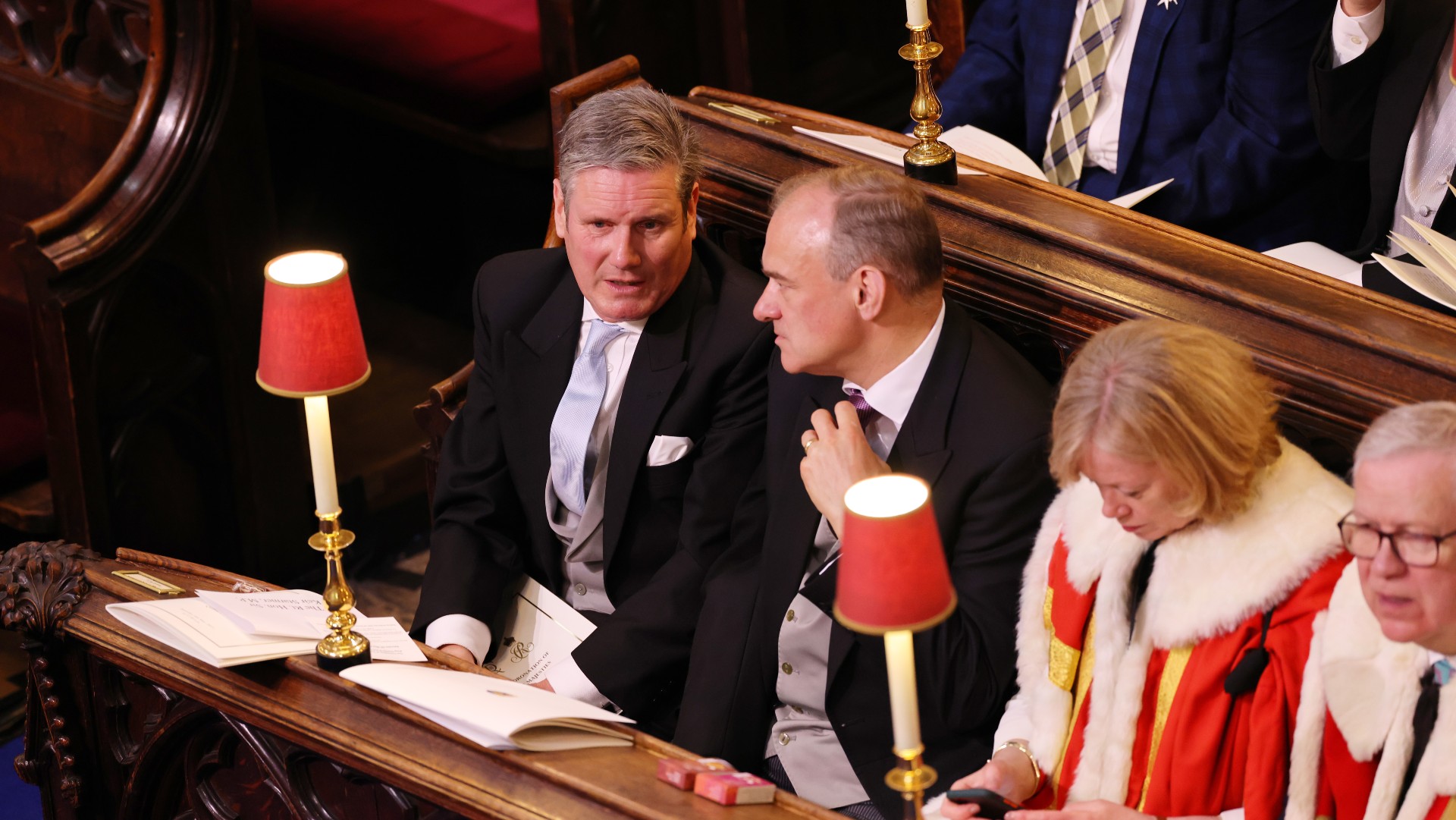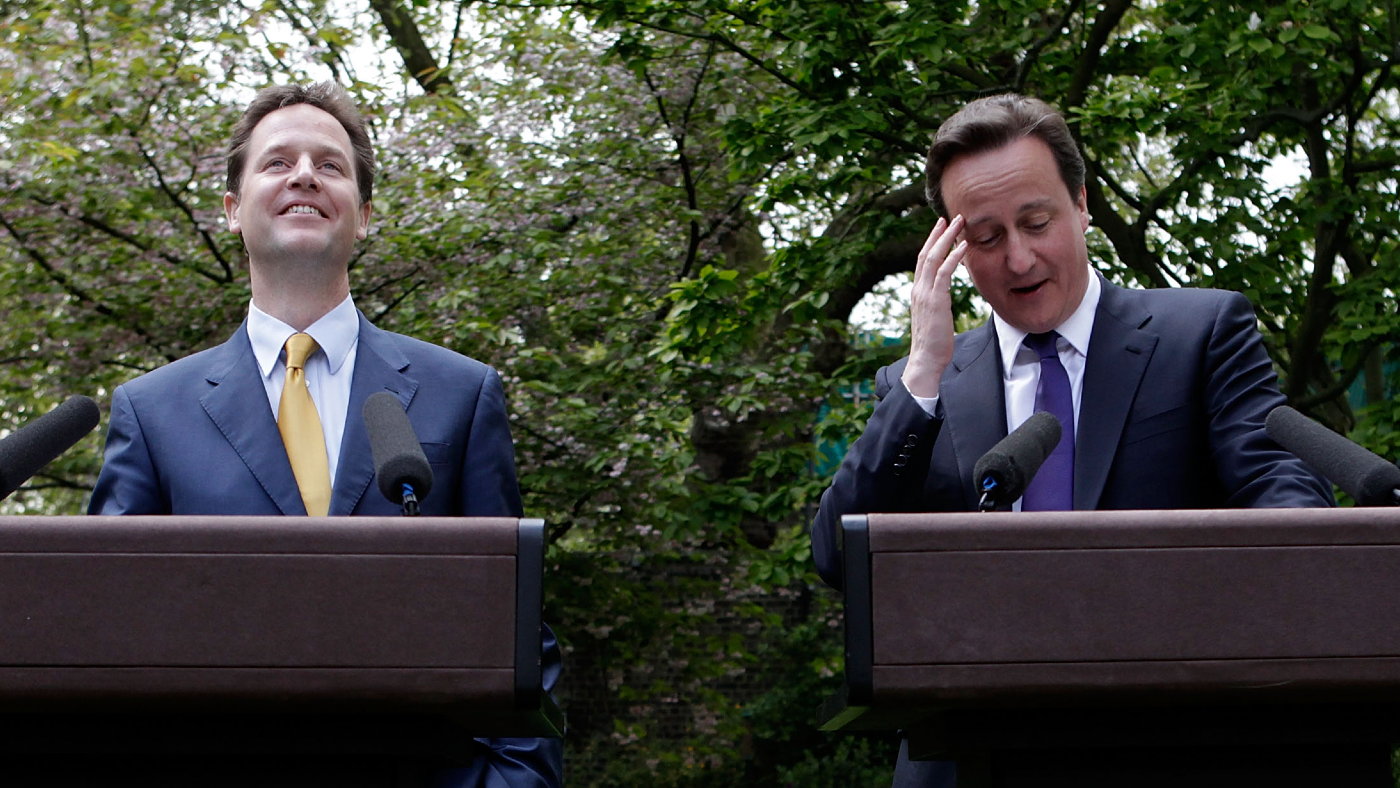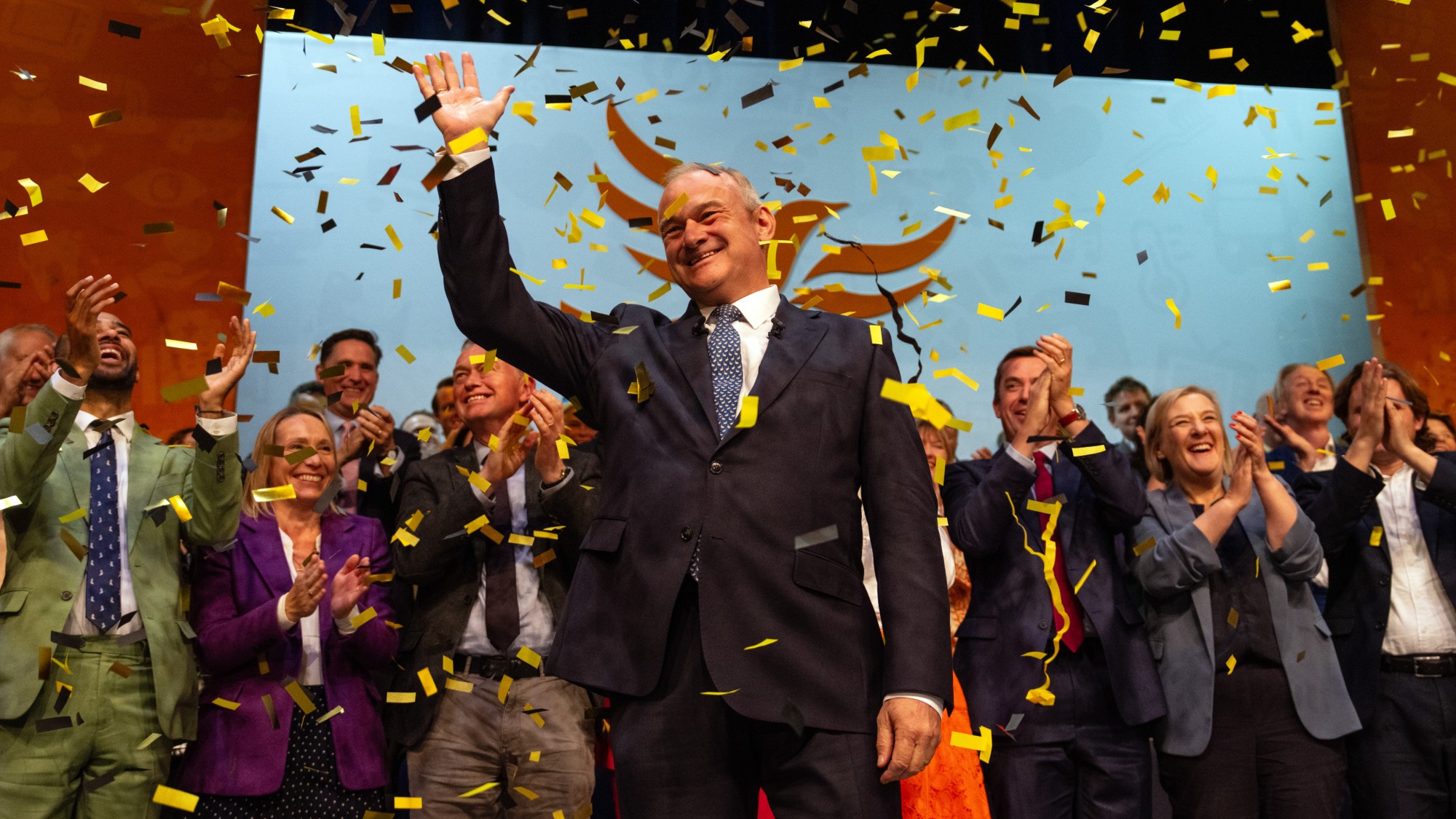What a Labour-Liberal Democrat coalition might look like
Starmer and Davey have refused to rule out a post-election deal, leaving some commentators warning of a 'coalition of wokery'

A free daily email with the biggest news stories of the day – and the best features from TheWeek.com
You are now subscribed
Your newsletter sign-up was successful
Ed Davey set hares running over a possible Liberal Democrat-Labour coalition by hinting recently that he might be prepared to do a post-election deal with Keir Starmer in the event of a hung parliament.
Asked by reporters if he would rule out doing a deal with Labour if no party wins an overall majority at the next general election, Davey "dodged the question", said the Daily Mail, replying simply: "I'm focused on the general election."
Former Tory minister Maria Caulfield warned that Davey was "keeping the door open to a grubby backroom deal with the Labour Party".
The Week
Escape your echo chamber. Get the facts behind the news, plus analysis from multiple perspectives.

Sign up for The Week's Free Newsletters
From our morning news briefing to a weekly Good News Newsletter, get the best of The Week delivered directly to your inbox.
From our morning news briefing to a weekly Good News Newsletter, get the best of The Week delivered directly to your inbox.
A new YouGov survey of 14,000 people has forecast a 120-seat majority for Labour if the election was held immediately, but there are still several months to go before any ballot takes place. If the opposition party falls short of a majority, could a Labour-Lib Dem coalition be on the cards? And would it look anything like the 2010-15 Conservative-Lib Dem coalition?
What would a Labour-Lib Dem coalition mean?
According to Maria Caulfield, the coming together of Labour and the Liberal Democrats would mean reneging "on the referendum result and Brexit".
"If voters vote for the Lib Dems they'll get Keir Starmer and we know he's been having negotiations on his trips to Europe, and that's what the Lib Dems would want on the table – another referendum or a much closer relationship with the EU," Caulfield said.
A Labour-Lib Dem deal would usher in a "coalition of wokery", said former Labour MP Tom Harris in The Telegraph. In recent years, Davey's party has "transformed from a pragmatic vehicle for change into a dogmatic party of the Left", Harris said.
A free daily email with the biggest news stories of the day – and the best features from TheWeek.com
The problem for Davey is that he has already made it clear that there are no imaginable circumstances in which Lib Dem MPs would help the Tories return to power, nor would they ever vote to bring down a minority Labour government.
Speaking to the Sky News political editor Beth Rigby at the Liberal Democrats annual conference in September, Davey ruled out any agreement with the Conservatives, saying his party could "play a critical role" in removing them from power.
Comments such as this put all the power in Labour's hands, noted Harris, and "why should Starmer concede anything to Ed Davey's party at all?"
What happened when the last coalition came together?
In 2010, a hung parliament meant that 57 Lib Dem MPs held the whip hand in negotiations. The Tories were the largest party with 306 MPs to Labour's 258 and Lib Dem leader Nick Clegg had promised to talk first to the largest party.
Clegg and David Cameron held a now famous press conference in the Downing Street Rose Garden, marking the first coalition government in the country since 1945. "The bonhomie on display in the splendour of the Rose Garden ushered in a new era of coalition politics," said Sebastian Whale in Politics Home. But it was short-lived, eventually resulting in "increased partisanship and polarisation".
It also led to devastating poll results for the Lib Dems in 2015, with the loss of nearly 50 MPs, an event that left them "scarred", according to The Guardian.

What are the potential pitfalls?
"England does not love coalitions," said Benjamin Disraeli in 1852 – a statement with which some Lib Dems might well sympathise. While Cameron secured a surprise victory in 2015, the Lib Dems were "eviscerated", returning just eight MPs, said Politics Home.
While there are many reasons for this – the Lib Dems' disastrous climbdown on tuition fees is widely cited as one – junior partners often tend to do less well in coalitions, a trend noted by The Washington Post. They can't enact much of what they promised before an election, nor can they sufficiently distinguish themselves from their more powerful partners once in government.
The coalition proved problematic for the Tories too. "Party loyalty broke down because a great many Conservative MPs at one stage or another felt this isn't really a Conservative government," Bernard Jenkin, a Tory MP, told Politics Home.
What are the benefits?
But there are also benefits in a coalition – both large and small parties have a chance to participate in government and hold important ministerial positions, with the opportunity for new ideas to be floated around the table.
"Coalitions may not be strong governments in the old sense," said Martin Kettle in The Guardian. "But they work. They get things done. They endure – especially when a prime minister or chancellor cannot dissolve parliament." And the alternative – a weak minority government fighting for survival – is not always preferable.
On the issue of the EU referendum, Tory MP David Gauke said the Lib Dems improved the government and helped "temper" the Tory right. "It meant the Conservative Party wasn't beholden to its right wing, which turned out to be a problem once there was a small Conservative majority," he added.
What do the Lib Dems want?
Labour and the Lib Dems agree on many issues, such as the environment, boosting public services and undoing some of the damage caused by Brexit. The Lib Dems, staunchly pro-EU, could attempt to force Labour into agreeing to another national vote on the UK's relationship with the 27-nation bloc in exchange for its support, reported the Daily Express.
There is also the matter of electoral reform. The party would hope to get rid of the existing first-past-the-post voting system and replace it with proportional representation, something that is "very important to the Liberal Democrats", its leader, Ed Davey, told the BBC last year.
So will it happen?
Labour appears to be hoping to take power at the next general election outright, said The Guardian. A Labour source told the paper that victory at last year’s Mid Bedfordshire by-election, where the party saw off a strong Lib Dem challenge to take a former Conservative seat, showed there were now "no no-go areas for us".
Still, Starmer and Davey have both been keen to leave the door open for a coalition. Meanwhile, the Tories will be hoping that talk of a Lib Dem-Labour pact will strengthen their hand by raising the spectre of "a coalition of chaos". A Starmer-Davey government would be more like a "coalition of tedium", one Westminster insider told Politico.
Arion McNicoll is a freelance writer at The Week Digital and was previously the UK website’s editor. He has also held senior editorial roles at CNN, The Times and The Sunday Times. Along with his writing work, he co-hosts “Today in History with The Retrospectors”, Rethink Audio’s flagship daily podcast, and is a regular panellist (and occasional stand-in host) on “The Week Unwrapped”. He is also a judge for The Publisher Podcast Awards.
-
 The Week Unwrapped: Do the Freemasons have too much sway in the police force?
The Week Unwrapped: Do the Freemasons have too much sway in the police force?Podcast Plus, what does the growing popularity of prediction markets mean for the future? And why are UK film and TV workers struggling?
-
 Properties of the week: pretty thatched cottages
Properties of the week: pretty thatched cottagesThe Week Recommends Featuring homes in West Sussex, Dorset and Suffolk
-
 The week’s best photos
The week’s best photosIn Pictures An explosive meal, a carnival of joy, and more
-
 How long can Keir Starmer last as Labour leader?
How long can Keir Starmer last as Labour leader?Today's Big Question Pathway to a coup ‘still unclear’ even as potential challengers begin manoeuvring into position
-
 The launch of Your Party: how it could work
The launch of Your Party: how it could workThe Explainer Despite landmark decisions made over the party’s makeup at their first conference, core frustrations are ‘likely to only intensify in the near-future’
-
 What does the fall in net migration mean for the UK?
What does the fall in net migration mean for the UK?Today’s Big Question With Labour and the Tories trying to ‘claim credit’ for lower figures, the ‘underlying picture is far less clear-cut’
-
 Will the public buy Rachel Reeves’s tax rises?
Will the public buy Rachel Reeves’s tax rises?Today’s Big Question The Chancellor refused to rule out tax increases in her televised address, and is set to reverse pledges made in the election manifesto
-
 Five takeaways from Plaid Cymru’s historic Caerphilly by-election win
Five takeaways from Plaid Cymru’s historic Caerphilly by-election winThe Explainer The ‘big beasts’ were ‘humbled’ but there was disappointment for second-placed Reform too
-
 The Chinese threat: No. 10’s evidence leads to more questions
The Chinese threat: No. 10’s evidence leads to more questionsTalking Point Keir Starmer is under pressure after collapsed spying trial
-
 The end of ‘golden ticket’ asylum rights
The end of ‘golden ticket’ asylum rightsThe Explainer Refugees lose automatic right to bring family over and must ‘earn’ indefinite right to remain
-
 The Liberal Democrats: on the march?
The Liberal Democrats: on the march?Talking Point After winning their highest number of seats in 2024, can the Lib Dems marry ‘stunts’ with a ‘more focused electoral strategy’?